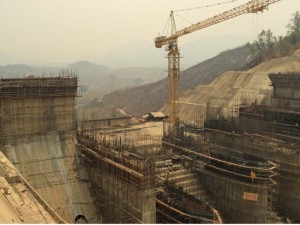6-12 May: Development Projects Fuel Conflict in Ethnic Nationality Areas
May 13, 2013 “Local communities and internally displaced persons are concerned that the dam plans will lead to increased militarization, human rights abuses, environmental destruction and loss of local livelihoods,” said the environmental lobby group, China Dialogue, talking about dam construction on the Salween River earlier this week. In recent weeks, there have been several examples of development projects directly contributing to armed conflict and militarization in ethnic nationality areas.
“Local communities and internally displaced persons are concerned that the dam plans will lead to increased militarization, human rights abuses, environmental destruction and loss of local livelihoods,” said the environmental lobby group, China Dialogue, talking about dam construction on the Salween River earlier this week. In recent weeks, there have been several examples of development projects directly contributing to armed conflict and militarization in ethnic nationality areas.
Fighting renewed between the Democratic Karen Benevolent Army (DKBA) and the government-backed Border Guard Forces in late April after the Burma Army ordered the DKBA to leave the area near the Hat Gyi hydropower dam site in Karen State. The DKBA refused to comply. Clashes have ceased but tensions remain high with the Karen National Union Brigade 5 also opposing the construction of the dam.
Earlier this year, the Burma Army ordered the Shan State Army-North (SSA-N) to vacate their base beside the Salween River, which they have occupied under the terms of a ceasefire agreement signed in January 2012. Clashes between the SSA-N and the Burma Army have multiplied since late February. The Burma Army is amassing troops to force the SSA-N to leave its territories near the Salween River, where a Chinese-backed mega dam project is set to be built. The fighting has already led to a humanitarian crisis with over one thousand people displaced.
In addition, conflict has renewed this week between the Burma Army and the Shan State Army-South (SSA-S) forcing 1,000 villagers to flee across the China border. Major Sai Lao Hseng said to the Irrawaddy, “the government army has not obeyed the ceasefire, which is a part of the peace process. So we feel like the ceasefire is just a peace accord on paper. It doesn’t reflect the reality on the ground.”
Civil society also raised concerns with Saw Alex from the Karen Environmental and Social Action Network warning that an increase in resource-grabbing by military-supported investment projects could lead to a flare-up in the ethnic conflict.
The peace process is stagnating. The government continues with its rhetoric to push for development in ethnic nationality areas before any political dialogue with ethnic armed groups takes place. As seen in Karen and Shan States, development projects exploiting ethnic areas’ resources, initiated before the root causes of the conflict have been addressed, and without social and environmental impact assessments and local population involvement in decision-making, will only fuel further outbreaks of conflict.
Development agencies, donor countries and international financial institutions must strictly follow a “do no harm” policy. They must ensure best practices are fully implemented in order to ensure their aid, investment and programs do not exacerbate ethnic conflicts.
News Highlights
Inside Burma
Daw Aung San Suu Kyi calls on UK university leaders to help rebuild Burma’s higher education system andannounces that the Constitution will be amended to change the role of the military, strengthen federalism and reform the judiciary
President Thein Sein vows to protect rights of minority Muslims and a day later, six Muslims are charged in relation to the violence in Meikhtila in March
Two Buddhists are arrested after Muslim shops were destroyed in northern Kachin State, five charged for defaming religion, aggravated burglary, unlawful assembly and vandalism in Moenyo Township, Pegu Region, are released on bail and 10 Arakanese Buddhists are sentenced to hard labor and prison for their role in the violence in Arakan State
Hundreds of Buddhist residents in Arakan State take to the streets to protest a government plan to resettle Rohingya internally displaced persons (IDPs), while a cyclone approaching western Burma raises serious concerns for IDPs in Arakan State
Regional
12-member NLD delegation visits China
International
US Ambassador urges Burma government to take action against people inciting violence on social media
Opinion
Despite Reforms, Myanmar’s Ethnic Violence Continues
By Matthew Smith
CNN
Myanmar Army Continues to Live in Denial Over Abuses
By Brad Adams
The Bangkok Post
Is Aung San Suu Kyi the Real Enemy?
By Mark Farmaner
The Myanmar Times
Latest from the Blog
Advances and Challenges to Media Freedom in Burma
By Burma Partnership
Actions
Statements and Press Releases
Burma: Act on Courts, Police Covering up Child Rape
By Asian Human Rights Commission
Open Letters Call for Civil Society Consultation on the Enabling Law of the Myanmar National Human Rights Commission
By Asian NGO Network on National Human Rights Institutions and 25 organizations from Burma
AAPP-B Condemns the Sentencing of Former Political Prisoner Under Article 401 (1)
By Assistance Association for Political Prisoners – Burma
Former Political Prisoner Forced To Serve Old Prison Sentence
By Burma Campaign UK
The Burmese Government Must Immediately End Human Rights Violations, Including Violence Against Women, in Palaung Areas
By Palaung Women’s Organization and Ta’ang Student and Youth Organization
Reports
Update of Human Right Violations by the Burma Army During Offensives in Palaung Areas (March and April 2013)
By Palaung Women’s Organization and Ta’ang Student and Youth Organization
This post is in: Weekly Highlights









 All posts
All posts